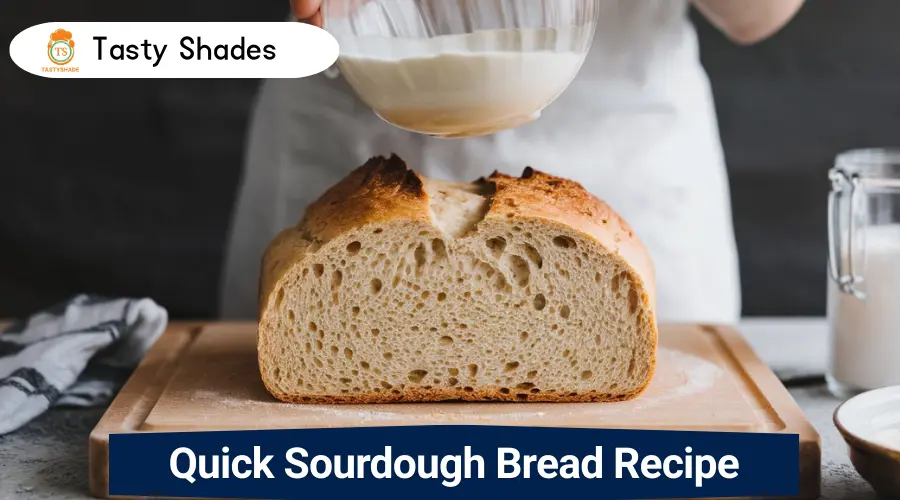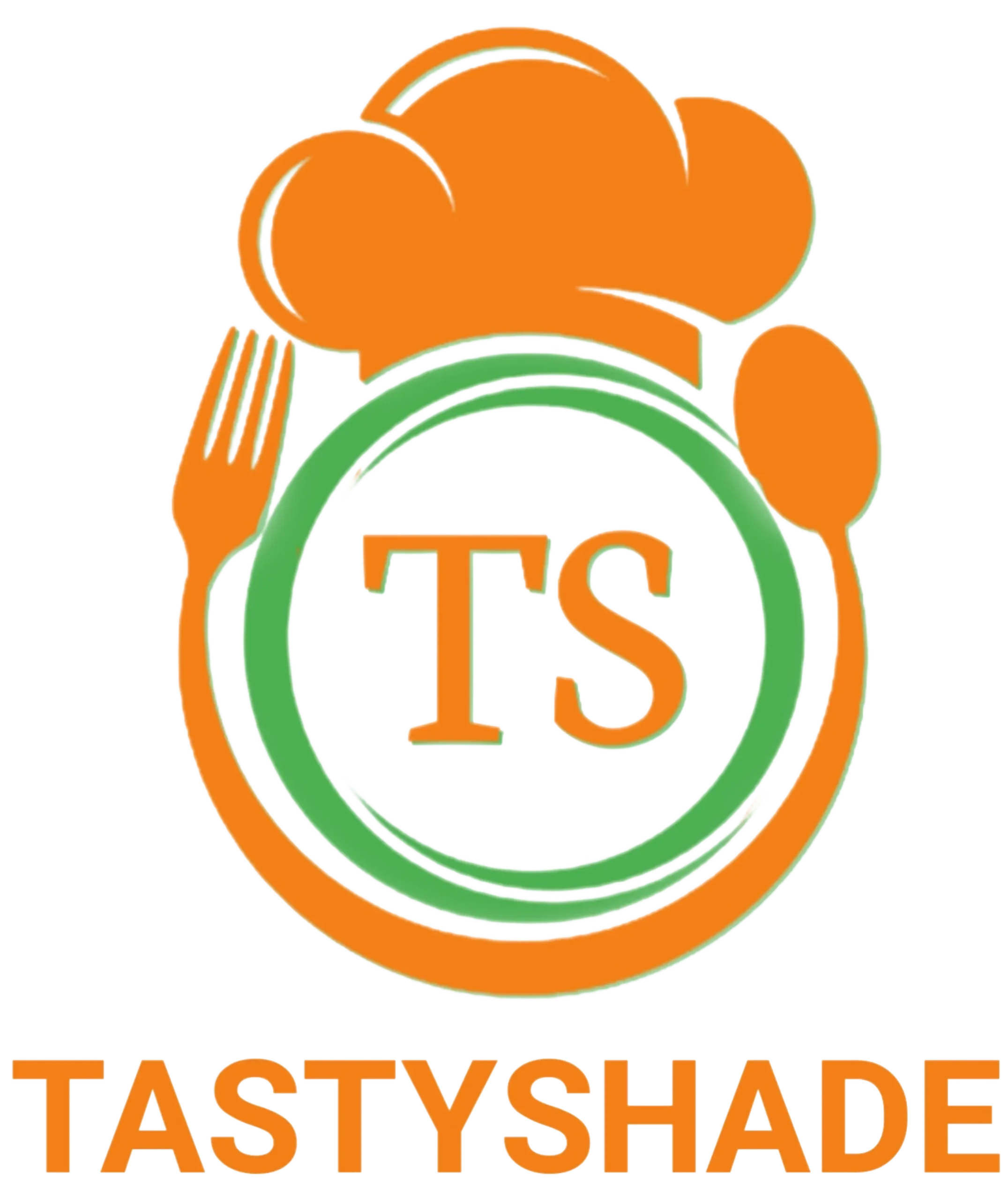Tastyshades explains Quick Sourdough Bread Recipe Sourdough bread, with its distinctive tangy flavor and chewy crust, has gained immense popularity. While traditional sourdough recipes can be time-consuming, this quick and simplified approach allows you to enjoy fresh, homemade sourdough bread in a fraction of the time.

What are the Top Ingredients for Quick Sourdough Bread Recipe and Why?
The key to a successful quick sourdough bread lies in the quality of its ingredients. High-quality flour, a robust sourdough starter, and pure water are essential for achieving optimal results.
- High-Quality Flour: Bread flour is ideal for sourdough bread as it has a higher protein content, resulting in a strong gluten network and a well-structured loaf.
- Robust Sourdough Starter: A healthy and active sourdough starter is the heart of sourdough bread. It provides the natural leavening agents, flavor, and unique character to the bread. Also read: Quick Daniel Fast Recipes
- Pure Water: Water quality can significantly impact the taste and texture of your bread. Filtered or spring water is recommended to avoid impurities that may affect the fermentation process.
250g Active Sourdough Starter
A 250g active sourdough starter is the ideal amount for this quick sourdough bread recipe. An active starter is characterized by its bubbly appearance and tangy aroma. To ensure your starter is active, feed it regularly with equal parts flour and water. A well-fed starter will contribute to a faster fermentation process and a more flavorful loaf.
400g Bread Flour
Bread flour is the ideal choice for this quick sourdough bread recipe. It contains a higher protein content than all-purpose flour, resulting in a strong gluten network. This strong gluten network is essential for achieving a well-structured loaf with a chewy crust.
10g Salt
Salt plays a crucial role in sourdough bread. It enhances the flavor of the bread and strengthens the gluten network, contributing to a better-shaped loaf. It also helps control the fermentation process, preventing the dough from overproofing.
300g Water
Water is a vital ingredient in sourdough bread. It hydrates the flour, allowing the gluten to develop and the yeast to ferment. The amount of water used can affect the dough’s consistency and the final texture of the bread. A higher hydration level results in a more open crumb, while a lower hydration level yields a denser loaf.
Quick Sourdough Bread Recipe Making Process
Making sourdough bread might seem intimidating, but this simplified process breaks it down into easy steps. With a few essential ingredients and some patience, you can bake delicious, homemade sourdough bread. (You may also like: Quick Pickle Recipe)
Mix the Dough
To begin, combine the sourdough starter, water, flour, and salt in a large bowl. Mix until a shaggy dough forms. The dough will be sticky at this stage, but don’t worry, it will become smoother as you continue to work it.
Bulk Fermentation
Once the dough is mixed, cover the bowl with a damp cloth and let it rest at room temperature. This process, known as bulk fermentation, allows the yeast to feed on the sugars in the flour, producing carbon dioxide gas. The gas bubbles create the bread’s airy texture.
Shape the Loaf
After the bulk fermentation period, gently turn the dough onto a lightly floured surface. Shape it into your desired loaf shape, such as a round boule or a rustic batard. Shaping helps to distribute the yeast evenly and tightens the gluten strands, resulting in a well-structured loaf.
Proofing
Place the shaped loaf in a floured banneton or a bowl lined with a floured cloth. Cover it and let it proof in the refrigerator for 12-24 hours. This slow, cold fermentation allows the flavors to develop and the dough to mature.
Baking
Preheat your oven to a high temperature, around 450°F (230°C). Score the top of the loaf with a sharp knife to create a decorative pattern and allow steam to escape during baking. Place the loaf on a baking sheet lined with parchment paper and bake for 20-25 minutes, or until the crust is golden brown and the loaf sounds hollow when tapped.
Conclusion
To conclude, baking sourdough bread is a rewarding experience that can be enjoyed by both novice and experienced bakers. By following this simplified recipe and understanding the key ingredients and processes, you can create delicious, homemade sourdough bread. Remember, patience and consistency are key to successful sourdough baking. Experiment with different flours, hydration levels, and baking techniques to discover your own unique sourdough bread.
What is the easiest quick sourdough bread recipe?
A simple recipe involves mixing flour, water, salt, and active sourdough starter. Let it ferment, shape it, and bake it.
How to make quick sourdough bread without kneading?
Use a wet dough technique. Mix the ingredients, let it rest, and shape it gently.
Can I make sourdough bread in one day?
Yes, with a strong starter and warm environment, you can achieve a quicker rise and bake the bread in a day.
What is the secret to a good sourdough loaf?
A good starter, proper hydration, and controlled fermentation are key to a flavorful and well-structured loaf.
How to make sourdough bread with sourdough starter?
Mix the starter with flour, water, and salt. Ferment, shape, and bake as usual.
Can I use bread flour for sourdough bread?
Yes, bread flour is ideal for sourdough bread as it has a higher protein content, resulting in a strong gluten network.
How long does it take to make sourdough bread?
The total time can vary. From mixing to baking, it can take anywhere from 8 to 24 hours, depending on the fermentation time.
What is the best temperature for sourdough bread to rise?
A warm temperature, around 75-80°F (24-27°C), is ideal for optimal yeast activity and fermentation.
How do I know when my sourdough bread is done?
The loaf should be golden brown, and when tapped, it should sound hollow. Use a thermometer to check the internal temperature, which should be around 200°F (93°C).
What is the best way to score sourdough bread?
Use a sharp knife to make shallow cuts on the top of the loaf. This helps control the shape and allows steam to escape during baking.
Can I use a bread machine for sourdough bread?
While possible, a bread machine may not provide the optimal environment for sourdough fermentation. Hand-shaping and proofing often yield better results.
How to store sourdough bread?
Store cooled bread in an airtight container at room temperature for a few days. For longer storage, freeze it in a freezer-safe bag.
What is the best way to freeze sourdough bread?
Wrap the bread tightly in plastic wrap or place it in a freezer bag. Freeze for up to 3 months.
How to reheat sourdough bread?
Reheat slices in a toaster oven or a regular oven. For a crispier crust, brush with water before reheating.
What is the best way to eat sourdough bread?
Sourdough bread is versatile. Enjoy it toasted with butter and jam, used for sandwiches, or dipped in olive oil.
Can I use sourdough starter for other recipes?
Yes, sourdough starter can be used to make pancakes, waffles, crackers, and even pizza dough.
What is the difference between sourdough bread and regular bread?
Sourdough bread is leavened with a natural sourdough starter, while regular bread uses commercial yeast. Sourdough bread often has a tangy flavor and a denser crumb.
Is sourdough bread healthier than regular bread?
While sourdough bread may have some nutritional benefits, it’s not necessarily healthier than regular bread. Both can be part of a balanced diet.
Can I make sourdough bread without a starter?
No, a sourdough starter is essential for making sourdough bread. It provides the natural leavening agents and distinctive flavor.
How to fix a sourdough starter that’s too sour?
Discard a portion of the starter and feed it with fresh flour and water. Continue to feed it regularly until the desired acidity level is reached.
How to feed a sourdough starter?
Typically, you feed your starter with equal parts flour and water. The frequency of feeding depends on the activity of your starter and the desired acidity level.
What is the best flour for sourdough bread?
Bread flour is ideal for sourdough bread as it has a higher protein content, resulting in a strong gluten network. However, you can also use all-purpose flour.
